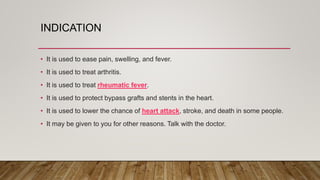Aspirin (drug presentation) for medical students .
- 1. DRUG PRESENTATION ON ASPRIN SUBMITTED BY NEHA NUPUR . ROLL NO. – 13 . BASIC B.SC NURSING 2ND YEAR . Submitted to Mrs. Stella Murmu Clinical tutor College of Nursing Rims Ranchi
- 2. CONTENTS • Client introduction. • DRUGS ADVICE • What is asprin ? • Drug introduction . • Dosages and routes. • Action and dose of aspirin. • Indication. • Contraindication. • Side effects. • Nursing considerations. • Patient teaching. • A.V. TOOLS. • REFRENCES.
- 3. CLIENT INTRODUCTION • NAME : Mr. MAHESH MANJHI • AGE : 42 years • SEX : MALE • ADDRESS : PURULIA JHARKHAND. • REGISTRATION NUMBER : IDO-443. • WARD : ORTHO D2 • CONSULTING DOCTOR : Dr. B Kumar UNIT. • CHIEF COMPLAINT : JOINT PAIN.
- 4. DRUGS ADVICE • INJECTION CEFTRIAXONE I.V . • INJECTION PANTAPARAZOLE I.V . • INJECTION ONDEM I.V . • TABLET BUFFERIN ORAL . • TABLET VITAMIN D ORAL . • TABLET CALCIUM ORAL .
- 5. ASPIRIN 👉
- 6. WHAT IS ASPIRIN ? • Aspirin is an ester • Alcohol+acid +ester • Aspirin is the common name for (ASA)acetylsalicylic acid and belongs to a group of drugs called salicylate . it is a White, crystalline, weakly acidic substance.
- 7. INTRODUCTION OF DRUG 🍥 • DRUG NAME : Aspirin. • TRADE NAME : Bufferin. • FUNCTIONAL CLASS : Nonopioid analgesic, nonsteroidal anti-inflammatory. • CHEMICAL CLASS : Salicylate.
- 8. DOSAGES AND ROUTES • Aspirin should be taken with food. Doses range from 50 mg to 6000 mg daily depending on the use. • Usual doses for mild to moderate pain are 350 or 650 mg every 4 hours or 500 mg every 6 hours. • Doses for rheumatoid arthritis include 500 mg every 4-6 hours; 650 mg every 4 hours; 1000 mg every 4-6 hours; 1950 mg twice daily. • Heart attacks are prevented with 75, 81, 162 or 325 mg daily. • 160 to 325 mg of non-enteric coated aspirin should be chewed immediately when experiencing symptoms of a heart attack. • The dose for preventing another stroke is 75 to 100 mg daily.
- 9. ACTION AND DOSE OF ASPIRIN • Effect of dose — Aspirin's effects and respective mechanisms of action vary with dose: • Low doses (typically 75 to 81 mg/day) are sufficient to irreversibly acetylate serine 530 of cyclooxygenase (COX)-1. This effect inhibits platelet generation of thromboxane A2, resulting in an antithrombotic effect. • Intermediate doses (650 mg to 4 g/day) inhibit COX-1 and COX-2, blocking prostaglandin (PG) production, and have analgesic and antipyretic effects.
- 10. INDICATION • It is used to ease pain, swelling, and fever. • It is used to treat arthritis. • It is used to treat rheumatic fever. • It is used to protect bypass grafts and stents in the heart. • It is used to lower the chance of heart attack, stroke, and death in some people. • It may be given to you for other reasons. Talk with the doctor.
- 11. CONTRAINDICATION • Inadequate Vitamin K • Gout , Anemia , Decrease in the Blood-Clotting Protein Prothrombin • Blood Clotting Disorder - Von Willebrand's Disease • Decreased Blood Platel • Thrombotic Thrombocytopenic Purpura • Presence of Polyps in the Nose • Stomach or Intestinal Ulcer ,Damage to Stomach Lining • liver problems , Bleeding of the Stomach or Intestines • kidney disease with reduction in kidney function • Pregnancy ,a mother who is producing milk and breastfeeding
- 12. SIDE EFFECTS • Rash, • Gastrointestinal ulcerations, • Abdominal pain, • Upset stomach, • Heartburn, • Drowsiness, • Headache, • Cramping, • Nausea, • Gastritis, and • Bleeding
- 13. NURSING CONSIDERATIONS • For patients who have had oral or dental surgery or tonsillectomy in the last seven days avoid chewable or dispersible aspirin tablets, or aspirin in crushed tablets or gargles. • Assess pain and/or pyrexia one hour before or after medication. • In long-term therapy monitor renal and liver function and ototoxicity. • Assess other medication for possible interactions - especially warfarin which is a special hazard. • Be aware that aspirin is a common constituent of a variety of over-the-counter medications. • Nurses should refer to manufacturer’s summary of product characteristics and to appropriate local guidelines
- 14. PATIENT TEACHING • Possible gastric irritation is limited by taking aspirin after food. • Keep this medication in the container it came in, tightly closed, and out of reach of children. • Store it at room temperature and away from excess heat and moisture (not in the bathroom). • Store aspirin suppositories in a cool place or in a refrigerator. • Take any missed doses as soon as you remember. But do not take a double dose to make up for a missed one. • Do not break, crush, or chew extended-release tablets and do not open extended-release capsules. Swallow them whole. • Always read the label of any over-the-counter medications to check for aspirin content. • Restrict alcohol intake. • Report any tinnitus, sweating or hyperventilation to the prescribing health care professional.
- 15. A.V. TOOLS • Books. • Mobile. • Internet.
- 16. REFERENCES • https://en.wikipedia.org/wiki/Aspirin • https://www.webmd.com/drugs/2/drug-1082-3/aspirin-oral/aspirin-oral/details • https://www.google.com.tr/search?q=aspirin&safe=active&biw=1366&bih=673&tb m=isch&tbo=u&source=univ&sa=X&ved=0ahUKEwiahs2b8dDJAhWJchQKHZH- CKcQsAQIPw&dpr=1 • https://www.medicinenet.com/acetylsalicylic_acid/article.htm#which_drugs_or_su pplements_interact_with_aspirin
















